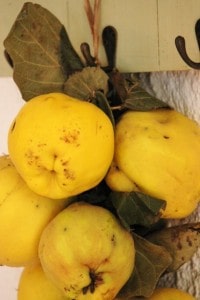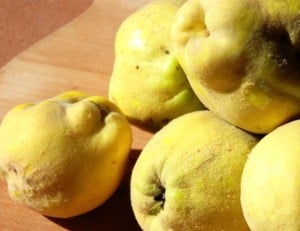There is no more depressing sight for me than my worktops covered with the fuzzy golden green lumps of quinces. Whilst Hugh Fernley Whitteringaway raves about them in The Telegraph and assorted British chefs who aren’t swamped by tonnes of the misshapen things write hymns to their history and subtle perfume I’d be quite happy if I never had another one in my life.
In the UK the quince is comparatively rare these days, they have vanished from orchards and fields as surely as ducking stools have vanished from village ponds (and indeed the ponds have gone too, replaced by cricket pitches and lately additional car parking). They are an old fruit, a little misunderstood, but capable of arousing passion and nostalgia in the hearts of those with a classical education and an educated palate (I don’t have one of those).
Anyone with a passing interest in myth and legend will happily bang on for hours about how the quince is probably the “apple” mentioned in every bible story and ancient legend from Adam and Eve in Eden to pretty boy Paris annoying Goddess’s on a hillside prior to the battle for Troy. You can lay a lot of shit at the door of this fruit!
Here in Turkey quinces grow like weeds, they love the open sunlight and rich soil of the valley bottom and we are inundated with them. I dislike them because honestly there isn’t an awful lot you can do with them and I will normally cut myself at some point peeling the wretched awkward things.
In the past I have made quince jelly (good with cold meat and cheese) and I have hung plaited strings of them in the kitchen where they look pretty but eventually end up being chucked out because I haven’t used them. They make me feel bad, which is really my fundamental problem with quince. I can’t find enough uses for them to justify the huge number I am given.
This year I hope I have a solution. Because quince goes so well with rich meat dishes I have poached them in syrup and frozen them to use in tagines and casseroles during the winter months and I have packed sliced ginger into a thick quince syrup which I hope will result in a crystallized ginger type thing in a few weeks – the jury is out on that, we’ll have to wait and see what happens, I may need to boil it up a couple of times but I really miss crystallised ginger.
Quince takes some fiddly preparation and a lot of cooking and the quinces we have here are not the perfect specimens you lucky people with access to supermarkets get. Our quinces do tend to be inhabited! So peeling and cooking quince involves first rubbing the fur off, then peeling them with a potato peeler, then chopping them up and getting them into lemon water as soon as possible as quince oxidises and goes brown in seconds, all the while keeping a sharp eye out for fly holes and maggots. To be honest I probably throw a good half of the fruit away in this process.After scrutiny and eviction of crawly things what you have left is chunks of a mealy kind of apple that is hard and sour when raw and needs long gentle cooking. This year I poached mine in a sugar, honey, lemon and ginger.
Just cover the uncooked quince with water, add a dash of lemon, a tablespoon or so of honey and an inch of grated ginger, bring it up to the boil and then simmer very gently for an hour until the fruit turns from pale cream colour to rose. Then drain the quince and boil the syrup vigorously until it is thick and bright red.
I have frozen my poached quince, covered in a layer of syrup, and I’ll use it later in the year. It makes an interesting addition to meat dishes, particularly those using Persian and Moroccan influences, giving a subtle enhanced sweet flavour to the spice mixes. As it is ready poached it can also quickly be turned into a relish to go with cold meat at Christmas or with a few additions into a sweet pie filling.
Maybe I shouldn’t be so hard on quinces, I will actually use them in various things now I have prepared them, and as an ancient symbol of love and fertility I guess I should honour them. Maybe they are like love, worth the effort in the end.


Oh Karen – you have said everything I feel about quinces SO well. The trees here are laden with them and our neighbours – generous at the best of times – have excelled themselves with their donation of quince to us, unsuspecting incomers. But I have had experience of quince – membrillo – in the north of Spain and know that what you say is true – from the inhabitants to the downright impossibility of peeling the things without serious injury.
And I don’t like membrillo jam and Cesar can’t eat ginger – so where does that leave us and the 15kgs of quince that sits in our ‘pantry’, I wonder? I do like the idea of a string of them as they seem to last well unpeeled – a festive swag perhaps?
Love like this is definitely conditional…
Axxx
Do you think that maybe, all across the Med, the locals are foisting these things on us and going back home with a happy sigh of “Thank God we got rid of those bloody things!” Festive swag, good idea, I was just about to spray some elderly walnuts (I won’t say whose!) gold for Christmas. If I sprayed the quinces gold it would trap the evil maggots inside. Ahh the rural idyll 🙂 xxxx
It sounds like they grow as prolifically as brambles do in the UK, Karen, and are as often neglected. Your post made my mouth water, even if the process of preparing them reminds me of trying to use the concrete-like pears from our pear-tree in France. 🙂
. . when we first came here to live the locals would insist on being sociable with a raki or three and a bowl full of slices of ‘wood’. They sipped and nibbled – sipped and nibbled; I sipped and tried to dispose of the wood pulp discreetly – sipped and tried . . you get the idea. My love of ‘Lion’s Milk’ lives on but the wood chippings go through the macerator and onto the compost heap!
If the choice is raki or quince I’d take the quince, raki would kill me, quince are less lethal. K xxx
I love quinces. But I have to admit, I’ve only ever eaten them raw or in jam, and have never tried cooking with them myself. Did almost fall out of a tree once in Daday, near Kastamonu, trying to pluck one.
I have similar feelings but certainly not from over abundance. They are a little tricky to deal with. I love your idea of poaching them in syrup and freezing for later use. I might give that a go. I found that cooking them in a pressure cooker works great for speeding up the process. It took me about 25 minutes for poaching 2 kg. If you have one you might have a whirl with that.
Ahh pressure cookers – they cost an arm and a leg here and are one of those things I am routinely subjected to whines about. I get whines on behalf of pressure cookers, dyson vacuum cleaners and compressors…all extremely useful things that are like gold dust here 🙂 Personally I’m really scared of pressure cookers, not helped by horror stories of steam puddings escaping through the vent like a villain in a James Bond film out of an aeroplane window. If I ever get one Nick can handle it but it’s a great tip for braver people than me. Karen
Oh but Karen, how much effort can one really put in before we throw in the towel and admit the quince is just not for us?! 😉 I’ll admit, I’ve only given the quince a couple of chances but I really can’t see where it’s next chance is coming from. 🙂
Julia
It’s the guilt, if it wasn’t for the guilt I’d be turfing them into the bin quicker than a quick thing, but they are given to me by people who smile a lot and are nodding happily and handing over these wretched things with every appearance of pride and I’m too guilty to just get rid of them. I’m Catholic and female, the guilt is built in, I daren’t make it worse. 🙂